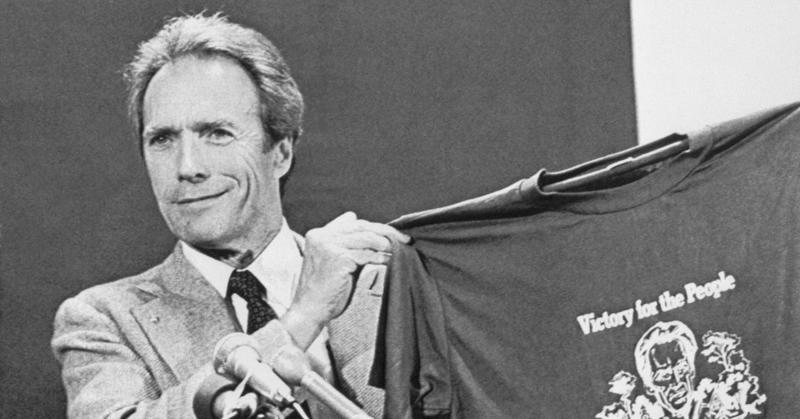1986: Clint Eastwood Was Elected Mayor Of Carmel, California
By | April 8, 2020

On April 8, 1986 Clint Eastwood became mayor of Carmel-By-The-Sea, California -- and the most famous local politician on the planet -- when he defeated incumbent Charlotte Townsend. This sleepy seaside town only had 4,500 residents and hardly any street signs. It was the perfect place for Eastwood, known for his Dirty Harry action movies and spaghetti westerns like The Good, The Bad, And The Ugly, to call home. It was also a great place to begin and end his political career, which was small in scale to say the least. According to the star he never really wanted to be mayor but after he butted heads with the city council over building office buildings on some of his property he decided to take matters into his own hands and change the city for good.
Why Carmel?

Eastwood took up residence in Carmel in the early '70s, buying up property and even opening a few small businesses, like the Hog’s Breath, an English-style pub. After 14 years of living in the town he felt that the shopkeepers and business owners were getting the shaft from the city council, but that fight had been going on long before Eastwood thought of running. In 1929 the city council decided:
The City of Carmel-by-the-Sea is hereby determined to be primarily, essentially and predominantly a residential city wherein business and commerce have in the past, are now, and are proposed to be in the future subordinated to its residential character.
From then on, heated back-and-forth between citizens who liked Carmel the way it was and businesspeople, who wanted to make the town more tourist-friendly, simmered, but it didn’t reach a boil until the 1980s.
During the election Eastwood was attacked for being 'pro-business'

Eastwood wasn’t even sure he wanted to run for mayor of Carmel until hours before the deadline. He conducted a phone survey to see if there was any point in running -- after all, the kayfabe toughest guy in Hollywood didn’t want to lose such a small political scrap in what would inevitably turn out to be a national story. After Eastwood decided to run, the incumbent mayor referred to Eastwood as “pro-business” after he sued the council for placing unreasonable restrictions on an office he was designing (they wanted it to be more wood than glass). Eastwood responded in an interview, saying:
I'm not pro-business. I never have been. The only person who says I am is my opponent. I want to help build bridges.
He won by a landslide

With the amount of eyes that were on the Carmel mayoral race you’d think that it was the tightest national election in the last decade, but there may have well not been an election. Eastwood won 72 percent of the votes with 2,166 people voting for him. When asked if he wanted to be referred to as “Mr. Mayor,” Eastwood responded, “Nah, it’s just Clint.” In his victory speech he referenced his desire to make the town a more business friendly place, saying:
I would like to think that we can now take the community out of the hands of the few and put it in the hands of the many, the people of Carmel.
Carmel opens for business

After he was sworn in as mayor, Eastwood turned the city council to the topic of restaurants based on what was referred to as the "ice cream cone law" after the council refused to grant a permit to an ice cream cone stand because it would use up too much water in a drought. Essentially, the town had outlawed fast food and discouraged all kinds of take-out dining in order to keep the riff-raff out. Eastwood made it his number-one goal to overturn the so-called ice cream cone law and make Carmel more tourist friendly. During his tenure as mayor he made it possible for more restaurants to open while creating a library annex and adding more public restrooms as well as a parking lot specifically for tourists.
There were huge crowds for his early city council meetings

It’s not a shocker that people were excited about Eastwood becoming mayor. He was one of the most beloved actors in Hollywood and most famous people in the world, so fans and rubberneckers wanted to see what he was like while conducting business. His first city council session lasted for six hours and the debate jumped from public restrooms to firework displays and the Pledge of Allegiance. The entire time there was a massive crowd of 350 people trying to shove themselves into a room made for 55 just to get a peek at Eastwood. He wasn’t too worried about remaining a spectacle and told a journalist that there was “limited excitement” to seeing him perform the job of a civil servant.
Eastwood was a one term mayor

The large crowds meant little to Eastwood’s detractors. With the increase of tourism the small town life became a prison. There was less parking, traffic filled the city’s main streets, and fly-by-night shops opened to sell "Clintsville" tchotchkes. What was once a quiet hamlet turned into a tourist trap over night. After two years acting as mayor Eastwood declined to seek reelection 1988. He told journalists that he was stepping down in order to spend more time with his kids and get out of the public eye. Throughout his term as mayor he drew a salary of $200 a month, when his term came to an end he donated it to a local youth center.
